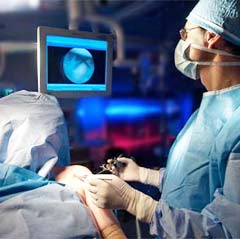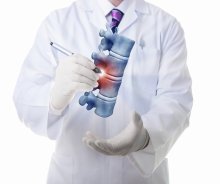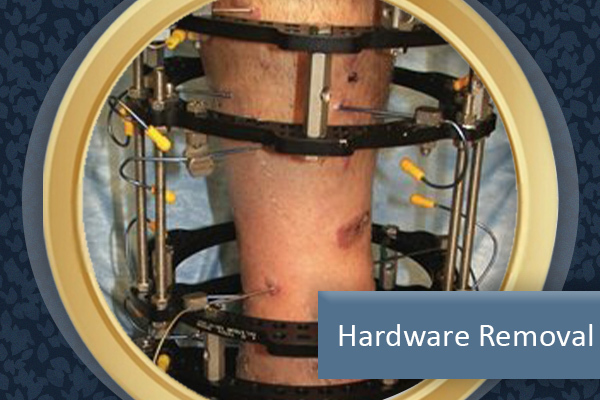Various Knee Treatment Options are Open to You
Custom-Fit Knee Replacement
 Knee replacement involves creating an artificial joint to replace damaged bone and cartilage. The vast majority of patients say this treatment significantly lowered pain levels and restored their quality of life.
Knee replacement involves creating an artificial joint to replace damaged bone and cartilage. The vast majority of patients say this treatment significantly lowered pain levels and restored their quality of life.
Knee replacement is recommended for patients who have severe pain while walking, climbing stairs, rising, or sitting down, or those with moderate to severe pain while resting; for an individual with a deformity such as bowed legs; or patients who fail to respond to other treatments such as cortisone injections.
While 90% of knee-replacement patients report a dramatic reduction of pain and improved mobility, knee replacement surgery is not for everyone. Each patient is unique, but your surgeon would probably not recommend running a marathon. Instead, you may be able to swim, play golf or tennis, drive a car, ride a bicycle or dance without pain.
The first step in deciding whether you are a candidate for knee replacement, is imaging tests to reveal the type and extent of damage to bone, cartilage and ligaments. Your orthopedic surgeon will explain what could be causing the pain, and together, you can decide on a treatment plan.
For more information about knee replacement, check out this web site of the American Association of Orthopaedic Surgeons: Beyond Surgery Day: The Full Impact of Knee Replacement
Knee Arthroscopy
 Arthroscopic surgery is a less invasive procedure and the recovery period is shorter.
Arthroscopic surgery is a less invasive procedure and the recovery period is shorter.
With arthroscopy, a camera about the size of a pencil is inserted into your knee. ‘Seeing’ inside your knee via an image on the video monitor, the surgeon inserts tiny instruments to repair or remove any damaged tissue.
Some 4 million patients undergo arthroscopic knee surgery each year, and the vast majority say the surgery resolved their pain.
For more information about arthroscopy for knees, see this web site.
Knee Ligament Reconstruction
 There is another type of treatment for damaged knees, called ligament reconstruction.
There is another type of treatment for damaged knees, called ligament reconstruction.
Ligaments are like rubber bands that surround the knee and give us flexibility while limiting dangerous movements. If the ligaments are torn (which happens in sports), there will be pain when the patient tries to turn, pivot, or twist their leg.
There are four major ligaments in the knee:
- anterior cruciate ligament (ACL);
- posterior cruciate ligament (PCL);
- medial collateral ligament (MCL);
- and lateral collateral ligament (LCL).
Ligaments can be surgically repaired by using a piece of healthy tendon from the patient’s own body or a donor.
For more about this procedure, visit Johns Hopkins Health Library
Torn Meniscus Treatment
 A torn meniscus is not an injury seen only in athletes. Knee cartilage becomes thinner and weaker as we age. Any sudden action can trigger a meniscal injury.
A torn meniscus is not an injury seen only in athletes. Knee cartilage becomes thinner and weaker as we age. Any sudden action can trigger a meniscal injury.
Many patients carry on with with daily activities without realizing they’ve suffered a meniscal tear. If your knee continues to ache and you feel a popping or locking of the joint, it’s best to have the doctor examine you.
Treatment depends on the type of meniscal injury. Some can be treated conservatively, with rest, ice and medication. Other tears can be relieved by surgery, to trim the torn cartilage or repair it.
Common Questions about Knee Surgery
What are the different types of knee surgery?
Some of the most common types of knee surgery are arthroscopic surgery, knee replacement, and ligament reconstruction. The type of surgery for you depends on the level of damage or injury, as well as other factors such as age and lifestyle.
Since there are many options out there, choosing the right one for your specific needs can be challenging.
Our orthopedic specialists in Florida are here to assess and plan the specific surgery that you need.
What are the signs of needing a knee replacement?
If nonsurgical treatments are no longer working enough to relieve your pain, this could be a sign that you need to have knee replacement surgery. For instance, you may have been dealing with your arthritis through other treatments, and find that they don’t provide as much relief as they once did.
Another sign is if the pain affects your daily life and overall mobility, to the point that you are unable to take on your usual activities. You may find it difficult to do the things you love, such as working out, or even simple tasks such as walking to the nearby store.
How long will it take me to recover from knee surgery?
Depending on the type of surgery, you may be required to stay around 1-4 days in the hospital following the procedure. After this, you’ll likely need to use crutches for a few weeks and take some medication to manage the pain.
Generally, without complications, patients are able to return to their usual, daily activities around 3 to 6 weeks following knee surgery.
The total time it could take for you to fully recover, however, can take months or up to a year. Your recovery time is affected by various factors, and following the advice of your orthopedic specialists during the healing phase is crucial.
What happens if you wait too long for knee replacement?
Delaying knee replacement surgery can not only aggravate the symptoms you are experiencing, but it can also lead to other serious consequences. For instance, you may later on require a more complicated procedure. Holding back on surgery could also make it less effective when you finally do it, as compared to those who had surgery sooner.
Over time, your quality of life could worsen, as you’ll experience more pain and mobility issues. Decreased mobility may cause further problems such as cardiovascular illnesses, as well as affect your mental health.
If you feel that you are in need of surgery, it’s best to consult with a specialist sooner rather than later.
What are the side effects of knee surgery?
As with any type of surgery, there are certain risks involved with getting knee surgery. There are complications specific to the actual procedure, such as persistent pain and implant failure.
In general, there are also possible complications associated with surgery, such as infection, hemorrhage, and reactions to anesthesia and medication.
After your surgery, your doctor will provide you with a detailed recovery plan. Following their specific instructions is important for your full recovery.














